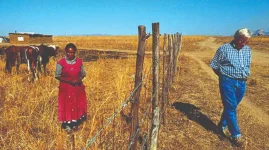What's going on with land in South Africa looks a lot like what happened in Zimbabwe years ago. Some people say we shouldn't compare these countries, but the similarities jump right out at me. I grew up where revolutions never finished and progress stalled. Places where we keep fighting to free ourselves from outside control. From where I stand, these countries share the same story.
I'm not trying to make everything about Zimbabwe. The patterns just match up perfectly. History runs on repeat - not the same events, but similar patterns when the basic conditions match. Both countries inherited huge land problems from colonial times. Black citizens ended up stuck in poor areas - Bantustans in South Africa, Reserves in Zimbabwe.
Both places have white populations who act entitled and refuse to change. White Zimbabweans came from Britain, and South Africans were mostly of Dutch ancestry. Colonial rule brought violence, unfair laws, and treated black people as less than human. Freedom came through talks - CODESA for South Africa, Lancaster for Zimbabwe - which created democratic systems that basically kept old economic powers intact.
These agreements pushed reconciliation without real justice. The deep social and economic problems stayed hidden but never went away, creating powerful white economic classes who felt entitled to keep their position. Land matters beyond farming—it includes mining, tourism, real estate, and more. White groups still control most of this wealth in South Africa, just as they did in Zimbabwe before 2000.
Foreign powers use trickery and diplomatic games to block changes to these colonial leftovers. They set up buyer-seller principles at the independence talks to delay real change. When countries try to correct these problems, foreign nations call them human rights abusers or dictatorships. They face diplomatic attacks, sanctions, and international isolation.
The script plays out the same for South Africa as it did for Zimbabwe. The Trump administration declared South Africa's Ambassador persona non grata. USAID pulled funding. The US labeled South Africa a human rights risk. White groups push scary stories about genocide and economic collapse if land changes hands.
South Africa can learn from Zimbabwe's mistakes, seeing land redistribution as a process rather than a quick event. President Ramaphosa recently declared that imperial powers won't bully South Africa. Former Zimbabwe President, Mugabe, might smile at this from beyond the grave. His fierce speeches against Western powers seemed extreme to many, but he predicted exactly what's happening today.
I wrote this as a lasting reminder about how land issues work in Southern Africa. The pattern repeats because the basic conditions remain the same. A new era approaches where our region must break free from old controls.
I'm not trying to make everything about Zimbabwe. The patterns just match up perfectly. History runs on repeat - not the same events, but similar patterns when the basic conditions match. Both countries inherited huge land problems from colonial times. Black citizens ended up stuck in poor areas - Bantustans in South Africa, Reserves in Zimbabwe.
Both places have white populations who act entitled and refuse to change. White Zimbabweans came from Britain, and South Africans were mostly of Dutch ancestry. Colonial rule brought violence, unfair laws, and treated black people as less than human. Freedom came through talks - CODESA for South Africa, Lancaster for Zimbabwe - which created democratic systems that basically kept old economic powers intact.
These agreements pushed reconciliation without real justice. The deep social and economic problems stayed hidden but never went away, creating powerful white economic classes who felt entitled to keep their position. Land matters beyond farming—it includes mining, tourism, real estate, and more. White groups still control most of this wealth in South Africa, just as they did in Zimbabwe before 2000.
Foreign powers use trickery and diplomatic games to block changes to these colonial leftovers. They set up buyer-seller principles at the independence talks to delay real change. When countries try to correct these problems, foreign nations call them human rights abusers or dictatorships. They face diplomatic attacks, sanctions, and international isolation.
The script plays out the same for South Africa as it did for Zimbabwe. The Trump administration declared South Africa's Ambassador persona non grata. USAID pulled funding. The US labeled South Africa a human rights risk. White groups push scary stories about genocide and economic collapse if land changes hands.
South Africa can learn from Zimbabwe's mistakes, seeing land redistribution as a process rather than a quick event. President Ramaphosa recently declared that imperial powers won't bully South Africa. Former Zimbabwe President, Mugabe, might smile at this from beyond the grave. His fierce speeches against Western powers seemed extreme to many, but he predicted exactly what's happening today.
I wrote this as a lasting reminder about how land issues work in Southern Africa. The pattern repeats because the basic conditions remain the same. A new era approaches where our region must break free from old controls.












